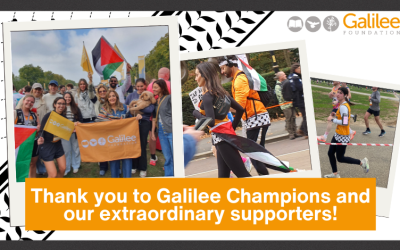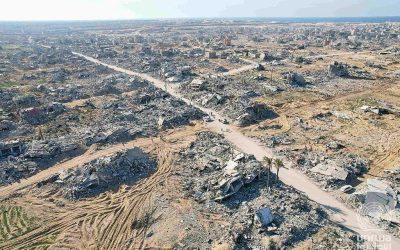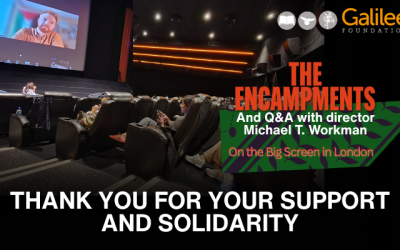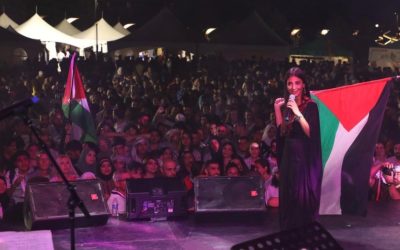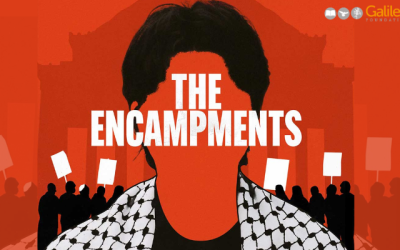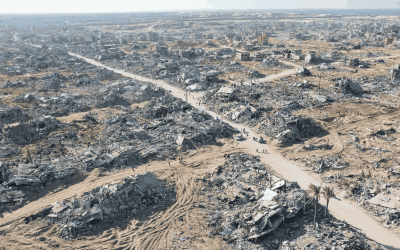Thank you to everyone who joined our charity screening of “From Ground Zero”, Palestine’s official entry to the Oscars.
And thank you to acclaimed Palestinian director and producer Rashid Masharawi, who was able to share his time to answer questions from the audience regarding this important project featuring 22 brave filmmakers from Gaza.
Below we have uploaded the full video for you to watch:
Below is a transcript of the entire Q&A:
Rashid Masharawi
Talking about the difficulty of communicating with directors across Gaza amidst a genocide
“We cannot charge mobiles or whatever, laptops or cameras or batteries. So sometimes we lost contact with everybody for a few days. Sometimes we need to be awake for a few days.
Once we have a point with electricity or with internet to be in contact, to upload material. After this, we get into another process to make the filmmakers join the editing and the colour correction and the final copies of the films. We were learning during the process.
We don’t know in advance how we will do or if we will manage or not. We don’t know. Thank you.”
Sawsan Asfari
“I’ll ask a question and then I’ll open it up to the audience. Rashid, you were the Palestinian entry to the Oscars. The film, I think, has toured in many countries.
What do you hope that the audience takes away from this film? I know Israel has tried to dehumanise the Palestinians for the past 70 years. And so, you know, we will watch this film and we see the human story of every Palestinian living in Gaza. And the film now looks better.
They had a bit of water, a bit of food. For the past few months, there’s been no food, no water, no electricity. First, what would you like the audience to take away from this film? What would you like the world to do? And one last thing, are you in touch with any of the people in the film? Are they all OK? Is your family OK?”
Rashid Masharawi
“Yeah, I will start from the end, which is the filmmakers, they are alive.
And some of them lost very close relatives, like one filmmaker, the one who made the film All Is Fine, the stand-up comedy, Nidal Damo, he lost his son. When the one who was in love with the women and they killed his girlfriend and she’s still underground, he is injured now. And as you saw in the film, the film Taxi Wanisa from Eitemad, she couldn’t finish the film because her brother and all his family were bombed.
Some others, they lost six people, seven people from the families. Most of them lost their houses. They are all alive.
I am in contact with everybody, with everybody. They are following the screenings. They were following the Oscar process.
These films were in more than 300 film festivals. And for sure, many official screenings like the UNESCO, the United Nations, the parliament in Strasbourg and many, many political screenings to try to influence. Now, what I want, I mean, it’s very, very simple, very simple what I want from the audience.
Why all this? Because we all see that we were dying or they kill us as numbers. Some days we have 200, 300, 500 numbers were dying. This project supposed to turn all these numbers to names, to faces, to a human being, people who has nothing to do with what’s going on, people who is innocent, people who have a dream, people who try all the time to add hope to life, people who think about tomorrow.
This time, all this was made parallel that the Israeli occupation media was trying to show all of us Hamas, all of us terrorists, I mean, all the kids and the women and the 50,000, 60,000 people who were killed and more than 100,000 injured, more than one million refugees. And everybody has trauma now and the hunger, they’re all terrorists. So these films were supposed to show that, I mean, they need to leave.
It means I want to share this story with the world to show they are humans like others. It’s mean, it’s sorry and bad to come today after 77 years of Israeli occupation to try to say again, we are also a human being like the others. We have families, we have same dreams.
We love our kids. We want to dance. We want to sing.
We want to make films. It means it’s very simple, but this is the basic of life. And we can make cinema also.
We can make films in Gaza. And very well as well. “
Sawsan Asfari
“I’m going to open it up to the audience.
I’m sure there’ll be some questions. Who would like to start over there? If you raise your hand, we can see you.”
Audience question 1
“Thank you very much for a very, very powerful film. I’m just curious regarding the bands that were singing and playing in the film. Are they a real band or were they just acting for the movie? Yeah, they are. Yeah, that’s my first question.”
Rashid Masharawi
“Yes, they are really a band and they are Gazan. And they stuck in Gaza like everybody. But the story here, it’s not… The story comes from the filmmakers.
This film called No and the director Hanna Alewa. Once we were in contact to ask her to join from ground zero and to make a short film. And she said, I cannot make a film about war.
I cannot. I never. I always make films about love, about life, about music, about beautiful things.
I can’t, but I want to participate. And then I asked Hanna, go two, three weeks and research and find out which film you want to do. And we will make a film about a filmmaker who cannot make a film about war, who can make a film about music, about life, about love.
Because she was telling me all the time, they are asking me, come and make a film about this building or this massacre or this martyr or suffering of the people. And I cannot. I say, OK, so the film more about her.
But to answer your question, they are really a band in Gaza and they were making films and singing and playing music to help kids for post-trauma during the war. “
Sawsan Asfari
“They’re called Soul Band, right?”
Rashid Masharawi
“Soul Band, yes, exactly. Soul Band, S-O-L.”
Sawsan Asfari
“OK, any other questions?”
Audience question 2
“Thank you, Rashid. Very impactful and actually even emotional watching the movie.
My question to you is where you ended your comment in terms of, you know, kind of showing the human impact of this war. We’re so overwhelmed by misinformed information. How do we make this mainstream? How can we get this out? Because, I mean, it’s still like, you know, if it is only in festivals, the mainstream here is not fully aware, has not seen these movies, these two pictures of what’s happening in Gaza.”
Rashid Masharawi
“Yeah. So we were trying since the beginning to make maximum screening, to show these films to maximum number of people. Even in Cannes last year, Sawsan was with us.
I was showing unfinished films. I was showing rough cuts of these films, films in progress and the war still going on. The last Cannes, I was showing other films from Gaza and the war still going on.
You know, we are cooperating with the French company called Co-Regimes. They are taking care of the distribution and the screening “From Ground Zero” in film festivals and events, even in private screenings, special screenings. We agree about all.
We are showing all. I understand lately that for the UK, we have a UK distributor. Once you got our contact from this screening here, from Sawsan, whatever, we can be in contact and we will help and support any screenings in the future.”
Sawsan Asfari
“I think your distributors are called Cosmic Cat, and that’s where we got the permission from them. And I understand in North America, it’s Watermelon Films.”
Rashid Masharawi
“Exactly. Exactly. Watermelon. Yes.”
Audience question 3
“ Hello. How do you get to choose the number of films that got into ground zero? And is it like part of a workshop? I’ve noticed there’s a lot of women also producers or films.
So I would like to, I’m interested to see the background. And do you have like more films that you could have included, but wasn’t?”
Rashid Masharawi
“It’s a very important question because actually, we start from the beginning. To do only 20 films.
And we end up with 22 films. Because there is some projects, ideas or filmmakers, stories that we cannot say no. We have our own, let’s say, team.
Because, you know, it’s true that it was my idea. I was the artistic supervisor of this project. But I had other advisors from different countries.
Also Palestinians, Arabic, Europeans. They were advisors to contact with me also the filmmakers. To make the selection, which what we want to do, what we don’t want to do.
And to work with the filmmakers like a workshop for training. Yes, to develop together the idea. And to discuss the final version of each film by keep it his film.
Even if it sometimes looks immature or looks a little bit rough or not really professional. It’s his. This is the reality.
We cannot do it our way. So to select the films, it was very simple also for us because we were clear. We were looking at the idea and to see, OK, this is untold stories.
This is a personal story. This can be made also artistically as a film. And also the filmmaker has relation also to cinema or to art.
Because maybe 10 of the 22, this is first film. But they are all an actor or cameraman or theatre director or painter, musician. And it was their own first film.
Even an editor make a film as a director. So it was training. Me, myself, since 20, 30 years, I always was making workshops in Palestine, in the West Bank, in Gaza.
And I was making trainings in many other countries in Europe and also in Arabic countries. So for me, this was also an occasion to turn all this to a workshop, to have more filmmakers in Gaza. The last thing I can add here, we are making now 10 documentaries after this project called From Ground Zero Plus.
And they are only documentary. And they are between 20 minutes to one hour, each real documentaries. We are, we finished to film eight.
We still two films are in shooting now. Five, we finished to edit. Because it’s not a project that we wanted to make the project and to be happy and to show it.
We want to share all the time the stories from Gaza to outside the world. So as long as the war still going on in Gaza, our cameras still going on in Gaza. Thank you.”
Sawsan Asfari
“Anyone else? Okay. I think we’ll wrap it up. But just the last question, Rashid.”
Audience question 4
“How hopeful are you? Do you believe in a better tomorrow for Palestinians?”
Rashid Masharawi
“You know, as a decision, yes, because I decided since long, long, long time ago that I wanted to be an optimistic. And if I want to participate just to make things better, my job is to add hope, not to complain and not to be frustrated. We passed many difficult periods because, you know, me as in Gaza, we lost my family, lost many houses.
We lost a big number also from my own family in Gaza, like the others. It’s been everybody touched. But still, I believe in cinema.
I trust cinema. I think cinema can protect us, can protect, defend our history, our identity, our culture. I believe in that.
That can protect our memory and the memory of the… This is why you cannot see these films, anyone as a news or as a reportage. We are not going to repeat what happened. You cannot hear the word Israel or Hamas or Palestinian Authority.
It’s not about that. It’s about innocent people who has nothing to do with all what’s going on. They are paying their own life because they are at this place at this time.
So my participation, myself, is to tell the people there is no war forever. There is no occupation forever. And to tell them also that the Israeli occupation, they are also paying a lot because how come they did all that to other human being was keeping being a human being.
You know, when you shake the house of your neighbour, your house can fell down. It means they are losing a lot from their own humanity. You know, I am someone who need peace with justice first, peace.
And I’m ready to leave with the Israelis as two states also. But I need also normal neighbours, normal society, healthy, not sick like what’s going on. Sometimes I wonder how come that they are not shouting all the mothers in Israel.
They don’t think there’s mothers in Gaza who has the same kids or doctors or teachers. You know, we have around 800,000 kids are not going to school for almost two years. All these people now dying from hunger or from frustration or from sick.
For sure, all the time they are dying from bombing. So I will continue to add hope. I will continue to make film.
I will continue to believe and tell the others that tomorrow will be better and no war and no occupation forever. And I really believe in that. Inshallah.”
Sawsan Asfari
“And I hope so. And I think we also have to pray for the Isrlis to have better souls and to humanise themselves and join the rest of humanity in condemning this genocidal extremist Isrli government. But good luck to you, Rashid.
Thank you so much for all your work and for bringing us this amazing project. And good luck and keep up the good work and stay safe. Thank you so much.”
Rashid Masharawi
“I’m really proud. Thank you. Thank you.”
Sawsan Asfari
“Thank you all for coming. As Maha said, if you’d like to support the work of the Galilee Foundation, you can go to our website www.galileefoundation.co.uk. Please do support Palestinian film, whether it’s our organisation or anybody else’s. By supporting filmmakers and Palestinian cinema, you are keeping the Palestinian cause alive.
Against this dehumanisation and genocide that is occurring now, we really need all your help, your voices, whether you lobby your MP, you write letters, you show up in protests. Whatever you can do, we are grateful for all your help and support and for showing up today. Thank you.”
